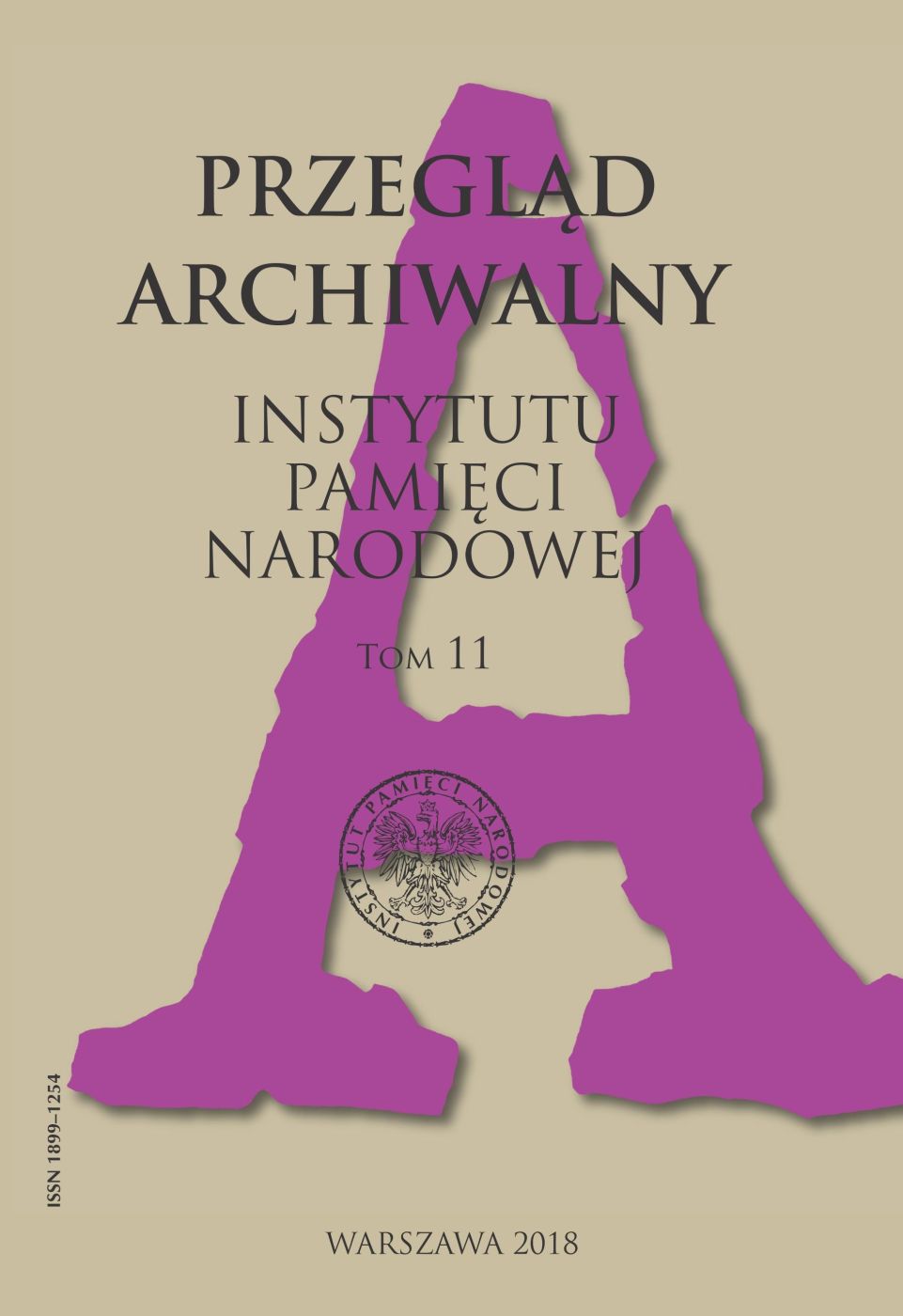Proces działaczy NSZZ „Solidarność” z Tomaszowa Mazowieckiego jako przykład represyjnej działalności sądownictwa powszechnego w okresie stanu wojennego
Przegląd Archiwalny Instytutu Pamięci Narodowej, Nr 11 (2018), strony: 295–364
Data publikacji: 2023-04-05
Abstrakt
Wymiar sprawiedliwości w okresie stanu wojennego stał się – obok aparatu bezpieczeństwa państwa – jednym z głównych narzędzi wykorzystywanych przez władze komunistyczne do zwalczania NSZZ „Solidarność”. Omawiany w artykule proces był konsekwencją rozpracowania przez Służbę Bezpieczeństwa grupy związkowców zaangażowanych w druk i kolportaż na terenie Tomaszowa Mazowieckiego nielegalnych materiałów. Dwa miesiące później Wojskowa Prokuratura Garnizonowa w Łodzi na podstawie Dekretu z dnia 12 grudnia 1981 r. o stanie wojennym wszczęła śledztwo pod zarzutem kontynuowania działalności zawieszonego związku, rozpowszechniania „fałszywych wiadomości” mogących wywołać „niepokój publiczny lub rozruchy” oraz redagowania, druku i kolportażu materiałów bezdebitowych. Aresztowano łącznie 12 osób, przesłuchano 53 świadków i przeprowadzono 33 przeszukania. Rozprawy przed Sądem Wojewódzkim w Piotrkowie Trybunalskim odbyły się 17–19, 26 i 28 maja 1982 r. Na karę 2 lat bezwzględnego pozbawienia wolności zostały skazane 4 osoby, warunkowe zawieszenie wykonania kary sąd zastosował wobec 6 osób, wobec jednej postępowanie umorzył, a jedną – uniewinnił. Sąd Najwyższy12 stycznia 1983 r. zawiesił na 4 lata wykonanie wyroków więzienia, wobec pozostałych osób utrzymano w mocy wyrok piotrkowskiego sądu. Po upadku systemu komunistycznego w Polsce możliwe stało się uniewinnienie skazanych, co SN uczynił 27 maja 1993 r.
Słowa kluczowe
represje komunistyczne • stan wojenny • NSZZ „Solidarność” • procesy polityczne • wymiar sprawiedliwości • Sąd Wojewódzki • Sąd Najwyższy • wyrok • pozbawienie wolności • Tomaszów Mazowiecki communist repression • martial law • NSZZ “Solidarność” • political processes • judicial system • Provincial Court • Supreme Court • sentence • imprisonment • Tomaszów Mazowiecki
Inne teksty tego samego autora
- Krzysztof Kolasa, VI Wiosenne Spotkania Archiwalne „Zarządzanie dokumentacją w badaniach naukowych, dydaktyce i praktyce”. Toruń, 21–22 kwietnia 2016 r. , Przegląd Archiwalny Instytutu Pamięci Narodowej: Nr 9 (2016)
- Sebastian Pilarski, Uciekinierzy z PRL – casus Andrzeja Perki , Przegląd Archiwalny Instytutu Pamięci Narodowej: Nr 3 (2010)
- Sebastian Pilarski, Cele i metody ankietyzacji działaczy politycznych i funkcjonariuszy służb mundurowych II Rzeczypospolitej , Przegląd Archiwalny Instytutu Pamięci Narodowej: Nr 2 (2009)
- Sebastian Pilarski, Krok ku wolności. Wybory czerwcowe 1989 i ich konsekwencje, red. Konrad Białecki, Stanisław Jankowiak, Rafał Reczek, Poznań 2015, ss. 356 , Przegląd Archiwalny Instytutu Pamięci Narodowej: Nr 9 (2016)
- Sebastian Pilarski, Robert Rabiega, Źródła do dziejów NSZZ „Solidarność” w zasobie archiwalnym Oddziału IPN w Łodzi , Przegląd Archiwalny Instytutu Pamięci Narodowej: Nr 6 (2013)
 Język Polski
Język Polski
 English
English


 PDF
PDF
